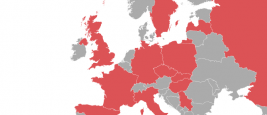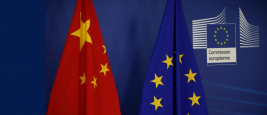In September and October 2020, the Sinophone Borderlands project at Palacký University Olomouc conducted a wide-scale survey of public opinion on China in 13 European countries. The polled countries include: Czechia, France, Germany, Hungary, Italy, Latvia, Poland, Russia, Serbia, Slovakia,...

European Union (EU)
As European Commission President Ursula von der Leyen announced on May 31 “a new growth plan” for the Western Balkans and the prospect of Hungary's EU Council Presidency in July 2024 spark controversy, EU enlargement is at the heart of discussions at the 2nd summit of the European Political Community (EPC).
In its judgment of 5 May 2020, the German Federal Constitutional Court in Karlsruhe questioned the conditions under which the European Central Bank (ECB) had adopted a Public Sector Purchase Programme (PSPP), thus contradicting the position taken by the Court of Justice of the European Union...
As international relations are increasingly reorganized around the US-China rivalry, the tensions between these two great powers are shaping a growing number of sectors, and the exchange of sensitive technologies in particular. This is a critical issue for European companies today. <...>
European buildings are old and too often inefficient, past policies have not delivered and the amount of investment into energy efficiency must be scaled up dramatically to meet the 2030 targets and ultimately, the carbon neutrality objective.
When politics catches up to the economy. In the wake of the EU-China summit, what can we expect from the bilateral relations? 2020 was supposed to be the year of EU-China relations. However, the Covid-19 pandemic has quickly disrupted the positive expectations.
The European Union (EU) is committed to reach climate neutrality by 2050. Similarly, Norway aims to create a zero-emission society by that same year.
Beyond national healthcare systems, COVID-19 questions major global balances, as well as the modes of cooperation underpinning them.
The recovery plan agreed upon by European Union leaders in July 2020 is unprecedented: for the first time, it creates a common debt that will help revive the economies impacted by the pandemic.
More than ten years after joining the European Union (EU), the Central and Eastern European countries (CEECs) exhibit a puzzle of attitudes and conceptions regarding the EU.
This report is part of a joint endeavor of the Centre for Applied Turkey Studies (CATS) at Stiftung Wissenschaft und Politik (SWP), along with Elcano Royal Institute (ELCANO, Madrid), The Polish Institute of International Affairs (PISM, Warsaw), Istituto Affari Internazionali (IAI, Rome) and...












